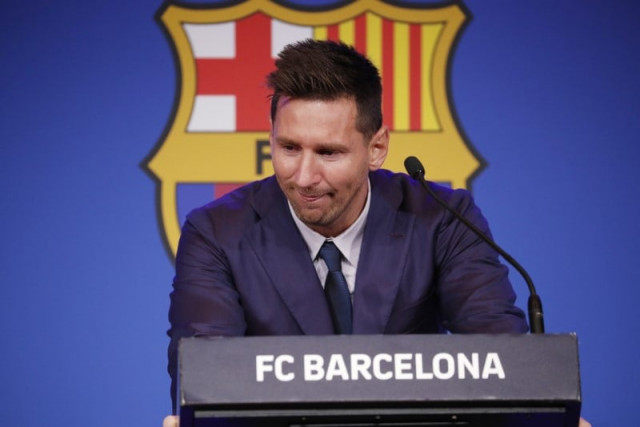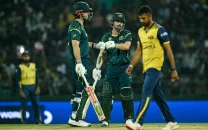Messi’s tearful departure encapsulates Barcelona’s sad decline
Argentine is set to join PSG as he expressed sadness of leaving his boyhood club after club’s financial mismanagement

Barcelona letting go Lionel Messi, arguably the greatest footballer in the history of the sport, because they cannot afford to keep him embodies the decline of the team he long incarnated – as the club’s financial mismanagement sent them slumping from the soaring achievements of the Pep Guardiola era to the status of also-rans.
An era beginning with the iconic moment in 2000 when a 13-year-old Argentine wunderkind called Lionel Messi signed for Barcelona on a napkin ended when – palpably upset – he confirmed he is leaving the team at a press conference on Sunday.
An epoch marked by exquisite passes, dazzling dribbles, of killer shots that stumped goalkeepers as the ball careered past them – impossible for football fans to imagine coming from anyone but Lionel Messi in his beloved Barcelona’s inimitable burgundy and blue stripes – is no more.
The 34-year-old football legend avoided specifics about his future at Sunday’s press conference, but when asked about a move to Paris Saint-Germain (PSG), Messi admitted it was a “possibility”.
‘Unsustainable’ financial situation
In a response that barely hints at the emotion Messi’s departure stirs, not just amongst Barcelona fans, the club’s manager Ronald Koeman tweeted on Saturday: “Still hard to understand that you will not play for @FCBarcelona anymore".
But, alas, from a financial perspective, it is all too easy to understand why Messi no longer plays for Barcelona. The Covid-19 pandemic hit even financially well-managed teams hard, taking months out of the game and depriving teams of ticket income; it pushed Barca into a €487 million loss after years of precarious finances.
The club faces nearly €1.2 billion of debt – most of which is short-term. With Messi, their players’ salary bill amounted to 110 percent of their income.
Regardless of Barcelona’s financial troubles, La Liga’s new spending rules cap their outlay. “We do not comply with financial fair play regulations,” the club’s president Joan Laporta admitted at Friday’s emotional press conference announcing that Messi would leave.
“Leo wanted to stay at Barca and we wanted him to stay,” Laporta continued. Messi had agreed to a pay cut of around half, bringing his yearly wage from Barcelona nearer to €20 million from some €45 million after tax. Laporta said his ardent desire was to be facing the media announcing that the deal was financially viable and that Messi would stay: “That was everyone’s dream.” But it was false hope.
Even “without Messi, we have no room”, Laporta told reporters, with players’ salaries still eating up an “unsustainable” 95 percent of income.
One of the most exciting prospects for Barcelona fans ahead of next season was the arrival of Sergio Aguero – the Argentine goalscoring powerhouse who accepted a €17 million pay cut to join his close friend Messi at Barca after a decade at Manchester City.
But now Aguero faces both the certain disappointment of not playing for the Catalans with his chum and the potential disappointment of being too expensive to register for Barca in the end.
Dismay over Bayern humiliation
Signing Aguero was the last in a series of Laporta moves to keep Messi happy at Barca. This came after Messi said he wanted to leave in the aftermath of their (in)famous 8-2 Champions League quarter-final drubbing at Bayern Munich’s hands in August 2020 – expressing profound dissatisfaction with Laporta’s predecessor Josep Maria Bartomeu.
Messi vented his dismay at this humiliation after Barca were thumped in the knockout stages by Juventus, Roma and Liverpool in the previous three years: The Champions League is “very difficult”, he told journalists, “but you have to compete”.
The Catalans’ financial difficulties and troubles on the pitch are bound together. It would have been almost impossible to maintain the superlative performances of the 2008-12 Guardiola era – as epitomised by the Barcelona’s two famous Champions League final victories over Sir Alex Ferguson’s Manchester United.
However, after five years of continuing to win trophies in style, Barca started to look like one of the weaker members of the footballing elite after selling Neymar to PSG for a record-smashing €222 million in 2017.
With his disinclination to pass and sometimes mercurial temperament, Neymar should have been all too easy to replace – especially with all that money flowing into Barca’s coffers for him. But they splashed out colossal sums of money – running the club into the financial ground – on players who failed to deliver.
French forward Antoine Griezmann (price tag: €120 million) has seldom performed for Barcelona as he did for Atletico Madrid and still does for France. Likewise, Philippe Coutinho (€135 million) has never looked as gifted at Barcelona as he did for Liverpool. Nor have Ousmane Dembélé (€135 million) or Malcom (€41 million) – to give but two examples – been a patch on the Barca stalwarts of the Guardiola era.
Barcelona have missed those old stalwarts – especially Spanish midfield maestros Xavi and Andres Iniesta – even more than Neymar.
Those two players, who both joined Barca as children and left in 2015 and 2018 respectively, incarnated the club’s hallowed midfield style of “receive, pass, offer, receive, pass, offer”, as Iniesta once put it. Those two made that deceptively simple instruction a devastatingly effective art form.
As Barca’s youth academy has failed to produce the next Messi, Xavi or Iniesta and the club’s financial incontinence has misfired, they have struggled to fill in the requisite strength in depth – as shown by their feeling the need to sign midfielder and striker Kevin-Prince Boateng (best known to British football fans for scoring a mere 3 goals for Portsmouth as they sank to relegation in 2009-10) on loan in 2019.
‘I don’t know what to say’
Arguably Barcelona’s worst transfer market move was in the summer of 2020, when they sold Uruguayan striker Luis Suarez to Atletico Madrid for a mere €5.5 million. Messi railed against the Barca hierarchy for this decision, addressing Suarez in a public Instagram post: “You deserved a farewell befitting who you are: one of the most important players in the history of the club […]. You did not deserve for them to throw you out like they did.”
Messi was vindicated: Suarez’s creative genius and goalscoring prowess (netting 21 last season), turbocharged Atletico to La Liga victory. Barcelona languished beneath Atletico and Real in third place – the first time they finished the league outside the top two since 2007-08, the year before Messi’s mentor Guardiola became manager and set off fireworks beneath the Argentinian’s career.
In May, Barca’s 2-1 defeat at home to Celta Vigo (hardly a footballing colossus) cruelly exposed their diminished powers. But even more cruelly, that match contained Messi’s last ever Barcelona goal. Slowly, then like lightning, he evaded the opposition defence to head a surging long ball into the bottom corner like he was just placing the ball where it belonged. For any other player, a goal of the season; for Lionel Messi, a humdrum affair.
“This year, my family and I were convinced we were going to stay here, at home – this is what we wanted more than anything,” Messi said at Sunday’s press conference, struggling not to cry.
“I have still not come to terms with the reality of leaving this club now, changing my life. I love this club,” he continued.
“The truth is I don’t know what to say,” he said, in tears.
As the footballing world weeps with him, perhaps the only thing left to say is to cite Messi’s statistics – the numbers that climbed to ever greater heights each week – and let them stand amid awed silence: 10 La Liga titles for Barcelona, 4 Champions League trophies for Barcelona, 778 games for Barcelona and 672 goals for Barcelona.



















COMMENTS
Comments are moderated and generally will be posted if they are on-topic and not abusive.
For more information, please see our Comments FAQ